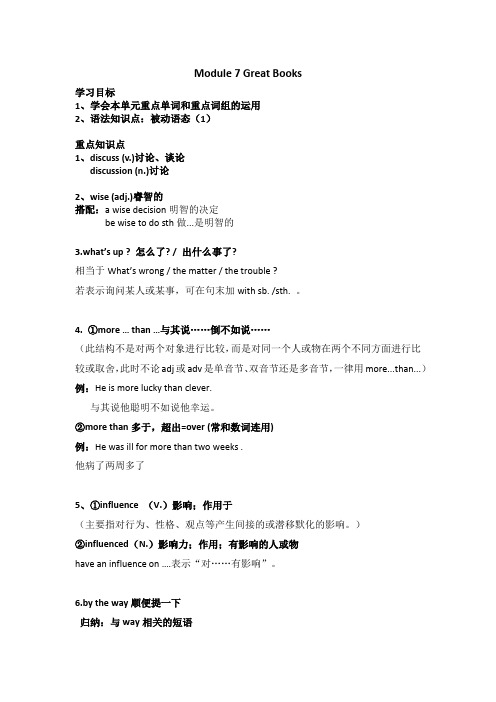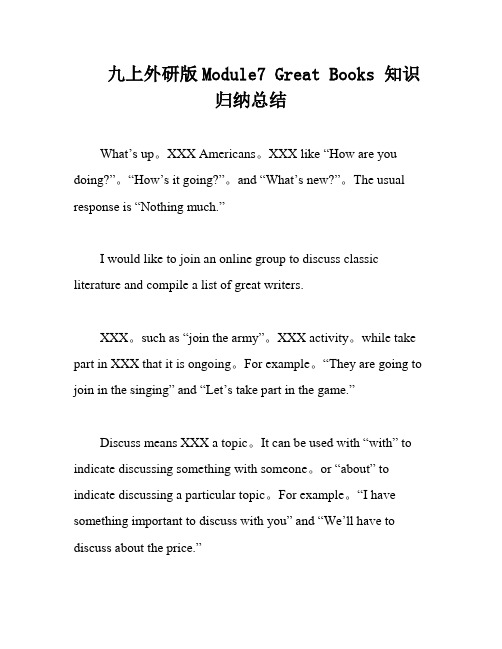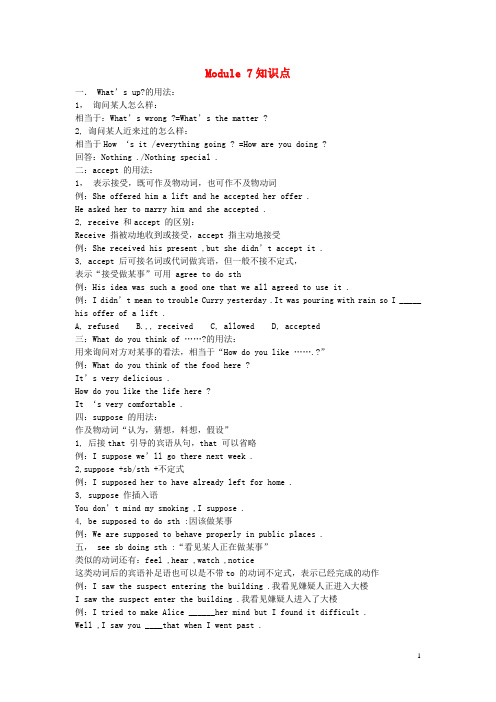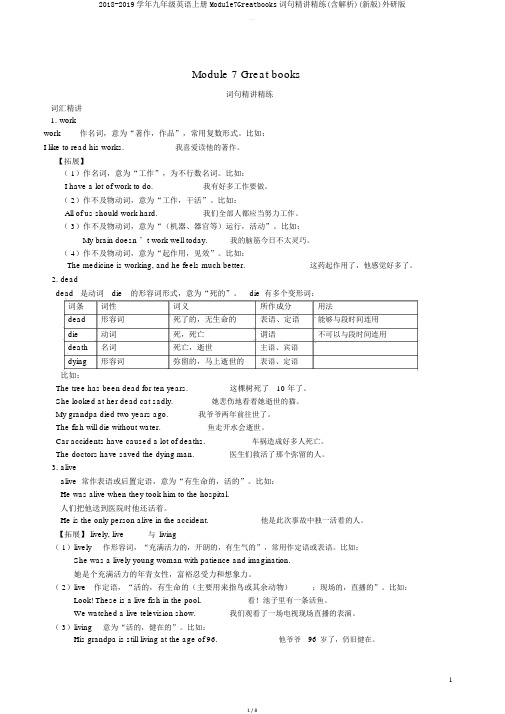九年级英语上册 Module 7 Great books词句精讲精练(含解析)(新版)外研版
九年级英语上册 Module 7 Great books Unit 3 Language in u

九年级英语上册Module 7Great booksUnit 3 Language inuse重要词汇、短语讲解素材(新版)外研版编辑整理:尊敬的读者朋友们:这里是精品文档编辑中心,本文档内容是由我和我的同事精心编辑整理后发布的,发布之前我们对文中内容进行仔细校对,但是难免会有疏漏的地方,但是任然希望(九年级英语上册Module 7Gr eatbooks Unit 3 Language in use重要词汇、短语讲解素材(新版)外研版)的内容能够给您的工作和学习带来便利。
同时也真诚的希望收到您的建议和反馈,这将是我们进步的源泉,前进的动力。
本文可编辑可修改,如果觉得对您有帮助请收藏以便随时查阅,最后祝您生活愉快业绩进步,以下为九年级英语上册Module 7 Greatbooks Unit3Language in use重要词汇、短语讲解素材(新版)外研版的全部内容。
九上Module 7 Unit 3 重要词汇、短语讲解重要词汇1。
influence 可以用作及物动词,意为“影响”。
如:I don’t want to influence your rest. 我不想影响你的休息。
influence还可以用作名词,意为“影响",表示“对某人/某物有影响”时,则构成短语have an influence on sb./ sth.。
2. dead是形容词,意思是“死的”,在句中常用作表语或定语。
如:Itis a dead dog。
这是一只死狗.【辨析】die, dying; death; deaddie是动词,表示“死亡”的动作,常与表示时间、地点、原因等的状语连用。
如:His father died in America in2003。
他的父亲在2003年死于美国。
dying是动词die的现在分词形式,它也可用作形容词,意为“将死的”。
如:The cat is dying。
这只猫快死了.death是die的名词形式,在句中常用作主语、宾语等。
九年级-初三英语上册(外研版)Module7Greatbooks知识点总结

九年级-初三英语上册(外研版)Module7Greatbooks知识点总结【关键字】英语、建议、情况、主意、方法、条件、会议、行动、认识、问题、主动、合理、执行、发现、了解、关键、网络、意识、思想、根本、需要、重点、作用、结构、关系、说服、拓展、引导、保证、帮助、解决、不放弃、影响力、新事物九年级-初三英语上册(外研版)Module7Greatbooks知识点总结一、重点词汇·原文再现I want to join an Internet group to discuss great books by great writers.我想加入一个网络群讨论名著,列出一系列的伟大作家。
·基本用法discuss v. 讨论;谈论(过去式:discussed 过去分词:discussed 现在分词:discussing 第三人称单数:discusses)We will discuss the proposal at the meeting.我们将在会议上讨论这项提议。
discuss可用于以下结构中:1. discuss sth. with sb. 和某人讨论某事。
如:I have something important to discuss with you.我有一些重要的事和你讨论。
2. discuss about sth.讨论关于某事。
如:We’ll have to discuss about the price.我们不得不讨论一下价格问题。
3. discuss+带有疑问词的动词不定式。
如:They discussed how to solve the problem.他们商量如何解决该问题。
·知识拓展--相关单词discussion n. 讨论,under discussion在讨论中;class discussion课堂讨论;group discussion小组讨论。
如:Their case is now under discussion.他们的案件正在讨论中。
外研版英语九年级上册 Module 7 Great books

Module 7 Great books1.discuss[dɪˈskʌs] v. 讨论,谈论2.thinker[ˈθɪŋkə] n. 思想家3.wise[waɪz] adj. 有判断力的,明智的4.review [rɪˈvju:] n. 评论(文章)5.influence [ˈɪnfluəns] v. 影响,作用于6.sense[sens] n. 道理,意义,合理性7.make sense 易理解,合情理,有意义8.by the way 顺便提一下(用于在交谈中插入新话题、题外话或评论) 9.suppose[səˈpəʊz] v. 猜想,推测,相信,认为10.well-known['wel'nəʊn] adj. 众所周知的,著名的11.adventure[ədˈventʃə] n. 冒险(经历)12.get into trouble 遇上麻烦13.run away 逃走,逃跑14.escape[ɪˈskeɪp] v. 逃离,逃脱15.cave[keɪv] n. 洞穴16.Dead [ded] adj. 死的,去世的17.for a time 一小段时间,一度,一时18.neighbour['neɪbə] n. 邻居19.funeral[ˈfju:nərəl] n. 葬礼20.surprised[səˈpraɪzd] adj. 惊奇的,惊讶的21.alive[əˈlaɪv] adj. 活着的22.southern[ˈsʌðən] adj. 南方的23.state [steɪt] n. 州,邦24.pay for 为……付出代价25.action[ˈækʃn] n. 举止,行为,情节26.everyday[ˈevrideɪ] adj. 日常的,普通的27.dialogue['daɪəlɒɡ] n. 对话。
外研版九上Module 7 Great Books

Module 7 Great Books学习目标1、学会本单元重点单词和重点词组的运用2、语法知识点:被动语态(1)重点知识点1、discuss (v.)讨论、谈论discussion (n.)讨论2、wise (adj.)睿智的搭配:a wise decision明智的决定be wise to do sth做...是明智的3.what’s up ? 怎么了? / 出什么事了?相当于What’s wrong / the matter / the trouble ?若表示询问某人或某事,可在句末加with sb. /sth. 。
4. ①more … than …与其说……倒不如说……(此结构不是对两个对象进行比较,而是对同一个人或物在两个不同方面进行比较或取舍,此时不论adj或adv是单音节、双音节还是多音节,一律用more...than...)例:He is more lucky than clever.与其说他聪明不如说他幸运。
②more than多于,超出=over (常和数词连用)例:He was ill for more than two weeks .他病了两周多了5、①influence (V.)影响;作用于(主要指对行为、性格、观点等产生间接的或潜移默化的影响。
)②influenced(N.)影响力;作用;有影响的人或物have an influence on ….表示“对……有影响”。
6.by the way顺便提一下归纳:与way相关的短语in the way挡路on the way…在去……的路上in this way用这种方式in a way在某种意义上all the way自始至终!7.run away逃走;逃跑run away from …从……逃走/逃跑8、escape from=escape out of逃离...、从...逃跑/逃9、be surprised to do sth.做某事感到很吃惊be surprised at sth对某事感到惊讶10.pay for 为……付出代价、为……付款/付钱辨析:pay , take , cost 与spend的区别11、重点词组1. make sense 讲得通;有道理2. by the way 顺便提一下3. not as…as... 不如…...一样......4. live with sb. 和某人一起生活5. get into trouble 遇上麻烦6. run away 跑掉;逃跑7. in the middle of 在...…中间8. take away 拿走;带走9. be pleased with sth. 对某事满意10. pay for 为…...付出代价11. in everyday English 用日常英语12. in the form of 以…...的方式13. grow up 长大14. get lost 迷路15. all the time 总是,一直16. miss school 缺课,逃学17. turn the situation round 扭转形势18. in return 作为回报19. be included in 被包含在…...20. for free 无偿,免费专项练习一、单项选择1. I can’t carry the box. Can you________?A. give meB. give me a handC. give me two handsD. give me hands2. May I ______ your new watch?A. have a lookB. give a look atC. have a look atD. try a look at3. _______ feed on grass, so they are green.A. TigersB. A sheepC. SheepD. Ships4. I’m loo king for the wallet _______ I lost yesterday.A. thatB. whoC. whatD. this5. “What are you _____ ?” “I’m preparing for my math test.”A. cookingB. goingC. upD. up to6. Yuan Longping is a scientist ______ is famous for the development of rice.A. thatB. whomC. whatD. which7.---I hope we’ll win the gold medal in the 2012 Olympic Games.---______ . I think you’re the best.A. No, you can’tB. I b et you willC. CongratulationsD. Thanks8. “Can I ______ your camera?” “Sure, here you are.”A. borrowedB. lendC. lentD. borrow9. Seeing sharks on the Great Barrier Reef is ______A. amazedB. amazeC. amazingD. amazes10. I hope to have an apartment ____ a kitchen so that I can save money by cookingfood by myself.A. haveB. hasC. withoutD. with11.-Can you imagine ________ in such a hot room for two months?-sorry, I can'tA. liveB. to liveC. livedD. living12.The book _____I put on the desk just now is gone.A. whoB. thatC. whyD. where13.--I want to win first prize in the coming school math competition.---________A. What’s it about ?B. I bet you do!C. Nice work!D. I’ll see to that14. Bondi Beach is one of ________ that I’ve ever seen in Australia.A. most beautiful beachB. the most beautiful beachesC. the most beautiful beachD. most beautiful beaches15. Would you like a hand ________ them?A. foundB. findsC. findingD. to find二、完形填空One day at the end of the class, a wise teacher told each of her students to 1 a plastic bag and a bag of potatoes to school.The next day she told her students: “From today on, for every person you don't like in your lives, you can choose a potato, write the person's name and the date 2 it and then put it in the plastic ba g.” Day after day, some of the students' bags were very 3 . They were then told to carry this bag with them everywhere they went for a week. They would put it inside their quilts 4 , on the seats when sitting in a car or on a bus , and next to their desks at school. The days carrying the bag around with them 5 students get to know what a weight they were carrying in their minds. They had to pay attention to it all the time 6 they wouldn't forget it. As time passed by, the potatoes went bad and 7 nasty(恶心). They all tried to get rid of them.Too often we think of tolerance(宽容)as a gift to 8 people, and it clearly is for ourselves! If we choose to keep our sadness and hatred(仇恨)in our 9 , we will have tocarry them around all our lives.Do you think you have got 10 from the wise teacher and what she asked her studentsto do?1. A. take B. bring C. put D. show2. A. in B. at C. on D. with3. A. heavy B. strong C. light D. big4. A. in the morning B. in the afternoon C. during the day D. at night5. A. kept B. made C. asked D. allowed6. A. as soon as B. since C. so that D. until7. A. sounded B. tasted C. smelt D. felt8. A. another B. other C. the other D. others9. A. hands B. eyes C. stomachs D. hearts10. A. anything B. nothing C. somebody D. Anybody三、阅读理解AMr. Zhang was a sports fan. He worked in a hospital in the capital. He was busy all the time and had little time to have a rest. And one day he felt unwell and couldn't go on working. He decided to spend a week's holiday in a quiet village where he could go swimming or fishing. He got off at a small railway station and soon got to a quiet village. He took a room hotel and went to sleep as soon as he had a good meal.At first Mr. Zhang enjoyed himself there. He could do everything he wanted and went wherever he liked. Nobody disturbed him and knocked at the door at midnight. But on the fourth day he was in trouble. After lunch it was very hot. He went swimming in the river. Suddenly he saw a beautiful bird in a big tree. He wanted to catch it, so he walked to it, but it found him and flew away and soon was gone. He began to pick some flowers in the forest and before long he lost his way.The sun had gone down and night had fallen before Mr. Zhang found a small restaurant in another village. He came in and told them to bring him some bread, two eggs and a glass of tea. After a while his food was brought. Soon he ate up all the bread and eggs. When he was going to have the tea, he found there was a fly in the glass.“ What's in my tea?” Mr. Zhang called out, “ A fly.”“ It's impossible, sir.” said the owner of the restaurant, “ I had told them to pick all the flies out of your tea before they brought it to you!”1. From the story we can guess Mr. Zhang may be a .A. engineerB. doctorC. tour guideD. translator2. Mr. Zhang decided to take this holiday because .A. he was too tired to go on workingB. he was very busy all the timeC. he was paid a lot of moneyD. he liked swimming and fishing3. Mr. Zhang hoped to spend a week's holiday by ..A. catching birdsB. swimming or fishingC. picking flowersD. having good meals every day4. Mr. Zhang went to the village from home ..A. by busB. by carC. on footD. by train5. Mr. Zhang didn't enjoy himself in another village, did he?A. No, he wasn't.B. Yes, he wasC. No, he didn'tD. Yes, he did.BIf a snake bites you, take a photo with your mobile phone! It can save your life. This is the surprising advice of a British cook. One day Henry Jackson was working in a restaurant kitchen. He picked up a dish from a table, and suddenly a snake appeared and bit him on the hand. A few days earlier, the snake came to the restaurant from Asia in a box of bananas. It climbed out of the box and hid under the dish. “ I tried to pick it up and it bit me. I threw it away, but it landed in the fridge. So I closed the doo r.” Jackson said. Anyway, Jackson was cool and he took a photo of the snake with his mobile phone. Soon his hand began to ache and he went to hospital. Then his chest began to hurt. Doctors couldn't say what was wrong because they didn't know what kind of snake it was.Then Jackson remembered his mobile phone photo. The doctors sent it to London Zoo. When they knew the kind of snake, they could give Jackson the right medicine, and he left hospital the next day. “ So my advice is this: If a snake bits you, pick up your phone. Take its photo first and then call the hospital. Show the photo to the doctors,” suggests Mr. Jackson. “ Oh, and if the snake doesn't smile for its photo, don't worry!”6. When the snake bit Mr. Jackson, it was .A. hiding in a box of bananasB. climbing out of a box of bananasC. lying under a dishD. climbing into the fridge7. Mr. Jackson threw the snake away probably because .A. he was surprisedB. he wanted to get a better photoC. his chest began to hurtD. the fridge door was open8. Mr. Jackson closed the fridge door so that .A. he could take a photoB. the snake couldn't go back to the zooC. the snake became coolD. he was safe from the snake9. The doctors gave Mr. Jackson the right medicine when .A. London Zoo told them what kind of snake it wasB. Mr. Jackson sent the photo to the hospitalC. he left hospital the next dayD. the snake bit him10. The text tells us if we are in danger and have a mobile phone with us, it will help us to do thing.A. oneB. twoC. threeD. four四、词汇应用One day, a man had an____1____(usual) experience. When he looked up into the sky, he saw a strange thing__2__ (fly) in the sky. It was not a plane or a bird. He couldn't__3__ (explain) what it was. After that, many people saw these unusual things. Those people saw these things in the sky, on the land, or in the water. These things __4__ (call) UFOs.Many scientists have a great____5___ (interested) in__6__ (study) UFOs. We often call these scientists UFOlogists. They study UFO___7__ (report) in newspapers and on the Internet. They find out that about 90% of all the UFOs people saw were just natural phenomena or man-made things. Some scientists even spend theirwhole__8__ (life) on UFOs. Some scientists are trying____9___ (find) UFOs from the___10___ (inside) world. We call __11___ (they) UFO Hunters. In fact, what they want to find are__12__ (alien).I believe they will find what they want to find.五、翻译句子1. 午饭时分,房间里撒满了阳光。
九上外研版Module7 Great Books 知识归纳总结

九上外研版Module7 Great Books 知识归纳总结What’s up。
XXX Americans。
XXX like “How are you doing?”。
“How’s it going?”。
and “What’s new?”。
The usual response is “Nothing much.”I would like to join an online group to discuss classic literature and compile a list of great writers.XXX。
such as “join the army”。
XXX activity。
while take part in XXX that it is ongoing。
For example。
“They are going to join in the singing” and “Let’s take part in the game.”Discuss means XXX a topic。
It can be used with “with” to indicate discussing something with someone。
or “about” to indicate discussing a particular topic。
For example。
“I have something important to discuss with you” and “We’ll have to discuss about the price.”I acknowledge that these writers are great because their works are still widely read today.Accept can mean “to receive”。
“to admit”。
九年级英语上册 Module 7 Great books知识点 (新版)外研版

Module 7知识点一. What’s up?的用法:1,询问某人怎么样:相当于:What’s wrong ?=What’s the matter ?2, 询问某人近来过的怎么样:相当于How ‘s it /everything going ? =How are you doing ?回答:Nothing ./Nothing special .二:accept 的用法:1,表示接受,既可作及物动词,也可作不及物动词例:She offered him a lift and he accepted her offer .He asked her to marry him and she accepted .2, receive 和accept 的区别:Receive 指被动地收到或接受,accept 指主动地接受例:She received his present ,but she didn’t accept it .3, accept 后可接名词或代词做宾语,但一般不接不定式,表示“接受做某事”可用 agree to do sth例:His idea was such a good one that we all agreed to use it .例:I didn’t mean to trouble Curry yesterday .It was pouring with rain so I _____ his offer of a lift .A, refused B.,, received C, allowed D, accepted三:What do you think of ……?的用法:用来询问对方对某事的看法,相当于“How do you like …….?”例:What do you think of the food here ?It’s very delicious .How do you like the life here ?It ‘s very comfortable .四:suppose 的用法:作及物动词“认为,猜想,料想,假设”1, 后接that 引导的宾语从句,that 可以省略例:I suppose we’ll go there next week .2,suppose +sb/sth +不定式例:I supposed her to have already left for home .3, suppose 作插入语You don’t mind my smoking ,I suppose .4, be supposed to do sth :因该做某事例:We are supposed to behave properly in public places .五, see sb doing sth :“看见某人正在做某事”类似的动词还有:feel ,hear ,watch ,notice这类动词后的宾语补足语也可以是不带to 的动词不定式,表示已经完成的动作例:I saw the suspect entering the building .我看见嫌疑人正进入大楼I saw the suspect enter the building .我看见嫌疑人进入了大楼例:I tried to make Alice ______her mind but I found it difficult .Well ,I saw you ____that when I went past .A, changed ;do B, changes ;doing C, change ;to do D, change ;doing六, be surprised to 的用法:“对。
九年级英语上册 Module 7 Great books模块语法小专题

Module 7 Great books模块语法小专题语法精讲一般现在时的被动语态1.概述语态表示句子主语和谓语动词的关系。
英语中有两种语态:主动语态和被动语态。
2.被动语态的句式结构The baby is looked after by Betty.这个婴儿被贝蒂照顾。
The baby isn't looked after by Betty.这个婴儿不是由贝蒂照顾。
Is the baby looked after by Betty?这个婴儿是由贝蒂照顾吗?Whom is the baby looked after by? 这个婴儿由谁照顾?3.主动语态与被动语态的转换方法(1)选“宾”做“主”:把主动语态的宾语变为被动语态的主语;(2)谓语被动化:动词由主动形式变为被动形式;(3)主语降级:主动语态的主语在被动语态中成了介词by的宾语,by短语可以省略。
4.被动语态的使用条件(1)要表达“被……;遭……;受……;让……”之类的语义时;(2)强调动作的承受者;(3)不知道或没有必要指出动作的执行者,此时省略“by+动作的执行者”。
语法精练Ⅰ.写出下列动词的过去分词。
1.be been 2.make made3.love loved 4.find found5.start started 6.read read7.help helped 8.understand understood9.hide hidden 10.punish punished11.think thought 12.grow grown13.respect respected 14.sell sold15.know knownⅡ.用括号内所给单词的适当形式填空。
16.The students are__told(tell) to take care of their desks and chairs.17.Vegetables,eggs and fruits are__sold(sell) in this shop.18.Knives are__used(use) for cutting things.19.The floor is__swept(sweep) by my sister every day.20.A Christmas present is__sent(send) to me by my uncle every year.21.The World Cup takes__place(take place) every four years.22.I won't leave my office until all the work is__finished(finish).23.Trees and flowers are__planted(plant) every year to make our country more beautiful.24.It is__not__allowed(not allow) to drive after drinking.25.—Can you tell me how to__make(make) apple juice?—Sure.Please watch carefully and you will see how it is__made(make).Ⅲ.将下列句子由主动语态变为被动语态。
【2020】最新九年级英语上册Module7Greatbooks综合能力演练(含解析)(新版)外研版

— Yes,but she isn’t known ________ a writer like her mother
A.for;as B.as;for C.in;to D.to;in
9.The teacher was ________ with what I said.
Reading for pleasure is not the same as studying.When you read for pleasure,you choose your own books,and you don’t have to remember everything.There are no tests on your pleasure reading books.Pleasure reading will help you:
Doctor Seuss was born in 1904.By the middle 1950s,he became one of the best-loved and most successful children’s book writers in the world.His books are very popular with young readers.They enjoy the invented words and the pictures of unusual funny animals and plants.
5.A.Until B.Because C.Although D.While
6.A.her B.him C.it D.them
7.A.sad B.pleased C.hard D.lucky
20182019学年九年级英语上册Module7Greatbooks词句精讲精练(含解析)外研版

丰富丰富纷繁Module 7 Great books词句精讲精练词汇精讲1. workwork作名词,意为“著作,作品”,常用复数形式。
比如:I like to read his works.我喜爱读他的著作。
【拓展】( 1)作名词,意为“工作”,为不行数名词。
比如:I have a lot of work to do.我有好多工作要做。
( 2)作不及物动词,意为“工作,干活”。
比如:All of us should work hard.我们全部人都应当努力工作。
( 3)作不及物动词,意为“(机器、器官等)运行,活动”。
比如:My brain doesn ’t work well today.我的脑筋今日不太灵巧。
( 4)作不及物动词,意为“起作用,见效”。
比如:The medicine is working, and he feels much better.这药起作用了,他感觉好多了。
2. deaddead是动词die的形容词形式,意为“死的”。
die 有多个变形词:词条词性词义所作成分用法dead形容词死了的,无生命的表语、定语能够与段时间连用die动词死,死亡谓语不可以与段时间连用death名词死亡,逝世主语、宾语dying形容词弥留的,马上逝世的表语、定语比如:The tree has been dead for ten years.这棵树死了10 年了。
She looked at her dead cat sadly.她悲伤地看着她逝世的猫。
My grandpa died two years ago.我爷爷两年前往世了。
The fish will die without water.鱼走开水会逝世。
Car accidents have caused a lot of deaths.车祸造成好多人死亡。
The doctors have saved the dying man.医生们救活了那个弥留的人。
外研版九年级上册Module 7 Great books 知识点精讲 课后练习

Module 7 Great books一、课前导入二、知识点梳理 1. review /r ɪ'vjuː/ n .评论vt .复查;重新考虑;复习; 回顾;评论 review the situation 对形势重新加以研究 review last week's lessons 复习上周的功课 n . 回顾;复习课;评论 a careful review of political events 有关政治事件的谨慎的回顾典例精讲:汉翻英____________________________________________. 学习英语最好的方法就是多复习。
2. sense /sens/ n. 道理【考点】make sense 合情理,有意义,一般不用于被动语态。
例:So it seems to make sense to let more people join in the discussion. 因此,让更多的人参与到讨论中似乎是合情合理的。
【重难点】与sense 相关的短语make no sense 无意义make sense of 理解;明白make sense to .对某人有意典例精讲:_______________________________________________.做如此多的家庭作业有意义吗?3. lively/'la ɪvli/adj .活泼的;轻快的eg :Tony is a lively and clever boy. 托尼是个既活泼又聪明的男孩。
【难点】辨析lively ,living ,alive 与livelively 可作定语或表语,修饰活着的生物或抽象概念(如description ,idea ,mind)。
The town is quite lively at night.这个城镇一到晚上就非常热闹。
living 意为“活着的;健在的”。
外研版九年级上册Module7Greatbooks知识点精讲课后练习(无答案)(K12教育文档)

外研版九年级上册Module7Greatbooks知识点精讲课后练习(无答案)(word版可编辑修改)编辑整理:尊敬的读者朋友们:这里是精品文档编辑中心,本文档内容是由我和我的同事精心编辑整理后发布的,发布之前我们对文中内容进行仔细校对,但是难免会有疏漏的地方,但是任然希望(外研版九年级上册Module7Greatbooks知识点精讲课后练习(无答案)(word版可编辑修改))的内容能够给您的工作和学习带来便利。
同时也真诚的希望收到您的建议和反馈,这将是我们进步的源泉,前进的动力。
本文可编辑可修改,如果觉得对您有帮助请收藏以便随时查阅,最后祝您生活愉快业绩进步,以下为外研版九年级上册Module7Greatbooks知识点精讲课后练习(无答案)(word版可编辑修改)的全部内容。
Module 7 Great books一、课前导入典例精讲:汉翻英____________________________________________. 学习英语最好的方法就是多复习。
2。
sense /sens/ n。
道理【考点】make sense 合情理,有意义,一般不用于被动语态。
例:So it seems to make sense to let more people join in the discussion。
因此,让更多的人参与到讨论中似乎是合情合理的。
【重难点】与sense相关的短语make no sense无意义make sense of 理解;明白make sense to sb。
对某人有意典例精讲:_______________________________________________.做如此多的家庭作业有意义吗?3. lively/’laɪvli/adj。
活泼的;轻快的eg:Tony is a lively and clever boy。
托尼是个既活泼又聪明的男孩。
【难点】辨析lively,living,alive与live典例精讲:汉翻英___________________________________________. 布朗先生总是能使他的课堂很生动。
九年级英语上册 Module 7 Great books知识点 (新版)外研版

Module 7知识点一. What’s up?的用法:1,询问某人怎么样:相当于:What’s wrong ?=What’s the matter ?2, 询问某人近来过的怎么样:相当于How ‘s it /everything going ? =How are you doing ?回答:Nothing ./Nothing special .二:accept 的用法:1,表示接受,既可作及物动词,也可作不及物动词例:She offered him a lift and he accepted her offer .He asked her to marry him and she accepted .2, receive 和accept 的区别:Receive 指被动地收到或接受,accept 指主动地接受例:She received his present ,but she didn’t accept it .3, accept 后可接名词或代词做宾语,但一般不接不定式,表示“接受做某事”可用 agree to do sth例:His idea was such a good one that we all agreed to use it .例:I didn’t mean to trouble Curry yesterday .It was pouring with rain so I _____ his offer of a lift .A, refused B.,, received C, allowed D, accepted三:What do you think of ……?的用法:用来询问对方对某事的看法,相当于“How do you like …….?”例:What do you think of the food here ?It’s very delicious .How do you like the life here ?It ‘s very comfortable .四:suppose 的用法:作及物动词“认为,猜想,料想,假设”1, 后接that 引导的宾语从句,that 可以省略例:I suppose we’ll go there next week .2,suppose +sb/sth +不定式例:I supposed her to have already left for home .3, suppose 作插入语You don’t mind my smoking ,I suppose .4, be supposed to do sth :因该做某事例:We are supposed to behave properly in public places .五, see sb doing sth :“看见某人正在做某事”类似的动词还有:feel ,hear ,watch ,notice这类动词后的宾语补足语也可以是不带to 的动词不定式,表示已经完成的动作例:I saw the suspect entering the building .我看见嫌疑人正进入大楼I saw the suspect enter the building .我看见嫌疑人进入了大楼例:I tried to make Alice ______her mind but I found it difficult .Well ,I saw you ____that when I went past .A, changed ;do B, changes ;doing C, change ;to do D, change ;doing六, be surprised to 的用法:“对。
- 1、下载文档前请自行甄别文档内容的完整性,平台不提供额外的编辑、内容补充、找答案等附加服务。
- 2、"仅部分预览"的文档,不可在线预览部分如存在完整性等问题,可反馈申请退款(可完整预览的文档不适用该条件!)。
- 3、如文档侵犯您的权益,请联系客服反馈,我们会尽快为您处理(人工客服工作时间:9:00-18:30)。
学习资料专题Module 7 Great books词句精讲精练词汇精讲1. workwork作名词,意为“著作,作品”,常用复数形式。
例如:I like to read his works. 我喜欢读他的著作。
【拓展】(1)作名词,意为“工作”,为不可数名词。
例如:I have a lot of work to do. 我有很多工作要做。
(2)作不及物动词,意为“工作,干活”。
例如:All of us should work hard. 我们所有人都应该努力工作。
(3)作不及物动词,意为“(机器、器官等)运转,活动”。
例如:My brain doesn’t work well today. 我的头脑今天不太灵活。
(4)作不及物动词,意为“起作用,奏效”。
例如:The medicine is working, and he feels much better. 这药起作用了,他感觉好多了。
2. dead例如:The tree has been dead for ten years. 这棵树死了10年了。
She looked at her dead cat sadly. 她伤心地看着她死去的猫。
My grandpa died two years ago. 我爷爷两年前去世了。
The fish will die without water. 鱼离开水会死去。
Car accidents have caused a lot of deaths. 车祸造成很多人死亡。
The doctors have saved the dying man. 医生们救活了那个垂死的人。
3. alivealive常作表语或后置定语,意为“有生命的,活的”。
例如:He was alive when they took him to the hospital.人们把他送到医院时他还活着。
He is the only person alive in the accident. 他是这次事故中唯一活着的人。
【拓展】lively, live与living(1)lively作形容词,“充满活力的,活泼的,有生气的”,常用作定语或表语。
例如:She was a lively young woman with patience and imagination.她是个充满活力的年轻女性,富有忍耐力和想象力。
(2)live作定语,“活的,有生命的(主要用来指鸟或其他动物);现场的,直播的”。
例如:Look! These is a live fish in the pool.看!池子里有一条活鱼。
We watched a live television show. 我们观看了一场电视现场直播的表演。
(3)living意为“活的,健在的”。
例如:His grandpa is still living at the age of 96. 他爷爷96岁了,仍然健在。
4. sense(1)sense作“意义”、“意思”解释时,与meaning是同义,是可数名词。
例如:The word “make” has many senses. make这个单词有许多意思。
(2)作“官能”解时,是可数名词。
例如:The five senses are sight, hearing, taste, smell and touch. 五种感官是视、听、嗅、味、触。
例如:A dog has a keen sense of smell. 狗的嗅觉很灵敏。
(3)作“感觉”解时,多用作单数,并与a 连用。
例如:When you touch ice, you have a sense of coldness. 当你触摸冰的时候,你有一种寒冷的感觉。
(4)可用sense来表示某种“感”,如幽默感、正义感、责任感等,这时在sense前加不定冠词。
例如:a sense of justice正义感;a sense of duty 责任感;a sense of humor幽默感;a sense of beauty 美感;a sense of safety 安全感; a sense of friendship 友好感(5)make sense of 意为“理解、弄懂……的意思”。
例如:Can you make sense of her letter? 你能弄懂这封信的意思吗?5. by the wayby the way意为“顺便说一声”。
例如:By the way,have you seen Harry recently?顺便说一句,你最近见过哈里吗?【拓展】和way相关的其他常见短语:(1)in the way有“挡路”的意思,还有“用这种方法”的意思。
例如:Sorry, you are in the way. 对不起,你挡路了。
In this way,he has collected a great many stamps.用这种方法他收集了大量的邮票。
(2)on the way 意为“在去某地的路上”。
例如:On the way to the station,I bought some chocolate.在去车站的路上我买了些巧克力。
(3)in a way意为“从某种意义上说”。
例如:In a way,it is an important book.在某种意义上,这是一本重要的书。
6. escape(1)escape作不及物动词,其后可接介词from/out of 表示“从……漏出/逸出;从……逃脱”。
常见用法如下:1)表示从具体的某一场所逃走。
例如:They escaped from the burning house。
他们从着火的房子里逃了出来。
2)表示液体或气体等漏出或泄漏。
例如:Some gas is escaping from the pipe. 煤气管在漏气。
3)表示从监禁或管制等状态中逃脱或逃走。
例如:A lion has escaped from its cage. 有一只狮子从笼子里逃走了。
(2)escape作及物动词,其后无需接介词from或其它介词。
例如:Nothing escaped his attention. 任何东西逃不过他的注意。
He tried to escape punishment. 他设法躲避惩罚。
7. influence(1)influence 作名词,意为“影响作用;有影响的人/物”。
既可当可数名词,又可作不可数名词。
常用短语have an influence on sb. / sth. 意为“对……有影响”。
例如:She used her influence with the chairman to get me the job.她利用对主席的影响使我得到了这份工作。
Gaye’s mother said I had a bad influence on her daughter.盖伊的母亲说我对她的女儿产生了坏的影响。
(2)influence作动词,意为“影响;起作用”。
例如:Don’t let me influence your d ecision. 别让我影响你的决定。
8. every day&everyday(1)every day 意为“每天”,是时间状语,可以用在句子的开头,也可以用在句子的结尾表示强调。
例如:Do you drink milk every day?你每天都喝牛奶吗?(2)everyday是形容词,它的意思是“每日的,日常的”,它在句子中可以作定语,也可以作表语。
例如:Do you often speak everyday English? 你经常说日常英语吗?词汇精练I. 英汉互译。
1. make sense_________2. 顺便说一下__________3. as well _________4. for a time _________5. 嘲笑__________6. escape from _________7. 长大 __________ 8. 考虑__________ 9. get lost_________10. pay for___________II. 根据所给汉语或首字母提示完成下列单词的拼写,使句意明确,语言通顺。
1. The book is written in e_________ English.2. The newspaper gives a _________ (评论) of the new book.3. What is the i_________ of television on children?4. A great scholar is not always a very ________(睿智的)man.5. Our relationship made me feel more a_________.6. Mark Twain is my favourite w________.7. On that cold night they found the cat d_________ in the snow.8. The family life in England is s________ to that in Australia.9. Their family moved to a ________ (南部的) city because it is warm in winter there.10. Confucius is great t_________.III. 用方框中所给词或短语的适当形式填空。
2. The little girl might __________. Her parents were looking for her.3. I want to be a doctor when I___________.4. The thief stole a bike and ___________ at once.5. I ___________ to meet my friends because we haven’t seen each other for 3 years.6. He __________ at the news.IV. 用所给动词的适当形式填空。
1. Today lots of man-made satellites ___________(send) up into space.2. Little hero, Lin Hao’s name ___________(remember) by all Chinese people.3. Vegetables, eggs and fruits ___________(sell) in this shop.4. The flowers ___________(water) by Lingling every day.5. These kinds of machines ___________(make) in Shanghai.6. English ___________(learn) as the second language by most student in China.参考答案I. 英汉互译。
